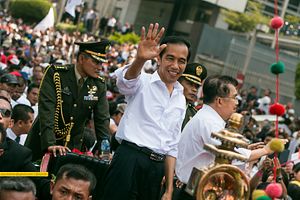Last week, Indonesian president Joko “Jokowi” Widodo vowed to double the country’s defense budget in 2016 if its economy grows by 7%.
According to Antara News, on May 13, Jokowi said that if the economy grew by 7%, the budget of Indonesia’ military (TNI) will more than double to 210 trillion rupiah ($16 billion) in 2016 from the current 98 trillion rupiah.
The vow is part of Jokowi’s campaign pledge to increase Indonesia’s defense budget to 1.5% of GDP from its current 0.8% as Jakarta seeks to achieve a so-called Minimum Essential Force by 2024. That is an urgent task. As I have pointed out earlier, since Jakarta’s paltry budget has never constituted more than 1% of GDP (unlike some of its neighbors like Malaysia or Vietnam), the lack of investment has made it difficult for it to perform even basic functions like controlling its own territorial waters (See: “An Indonesian Defense Revolution Under Jokowi?”). Getting there, however, would require healthy economic growth, and Jokowi had pledged to boost GDP growth to 7% on average during his term which ends in 2019.
That goal is looking increasingly unlikely at this point. According to the Central Statistics Agency (BPS), Indonesia’s economy grew just 4.71% year-on-year during the first quarter of 2015, slowing down from over 5% in the previous quarter and constituting the slowest growth since 2009. Sluggish economic growth in China and Japan – two of Indonesia’s key trading partners – combined with tightening global financial conditions, low commodity prices, and a weak rupiah – are expected to pose significant challenges for Jakarta. Indonesia’s own central bank, Bank Indonesia, forecasted in its latest report that the economy would only grow as much as 6% in 2016, as opposed to Jokowi’s intended target of 7%. Looking further out, it also said that growth would increase to 6.5% in 2019, which was below Jokowi’s 7.7-8.3% goal.
Jokowi, for his part, acknowledged these difficulties in his remarks but insisted that the target was still achievable.
“Our economy is facing global financial pressures. The global economy is facing a downward trend, but I am sure if the stability [and] security is maintained, the economy will grow by 7 percent,” he said.
If current conditions persist, however, it is more likely that Indonesia will boost its defense budget significantly but not by as much as and as quickly as he would like. Beyond this target however, as the discussion on Indonesia’s defense budget continues, it is important to look at not just the amount Indonesia is spending, but how it is spending that money over the next few years. For instance, as I have pointed out before, Indonesia’s defense spending distribution is currently skewed significantly toward personnel costs (two-thirds by some estimates), rather than procurement or research and development. And budget transparency and financial accountability remain significant problems, even though the Ministry of Defense is taking some steps in the right direction in this regard. As with most defense budgets, the devil often lies in the details.

































